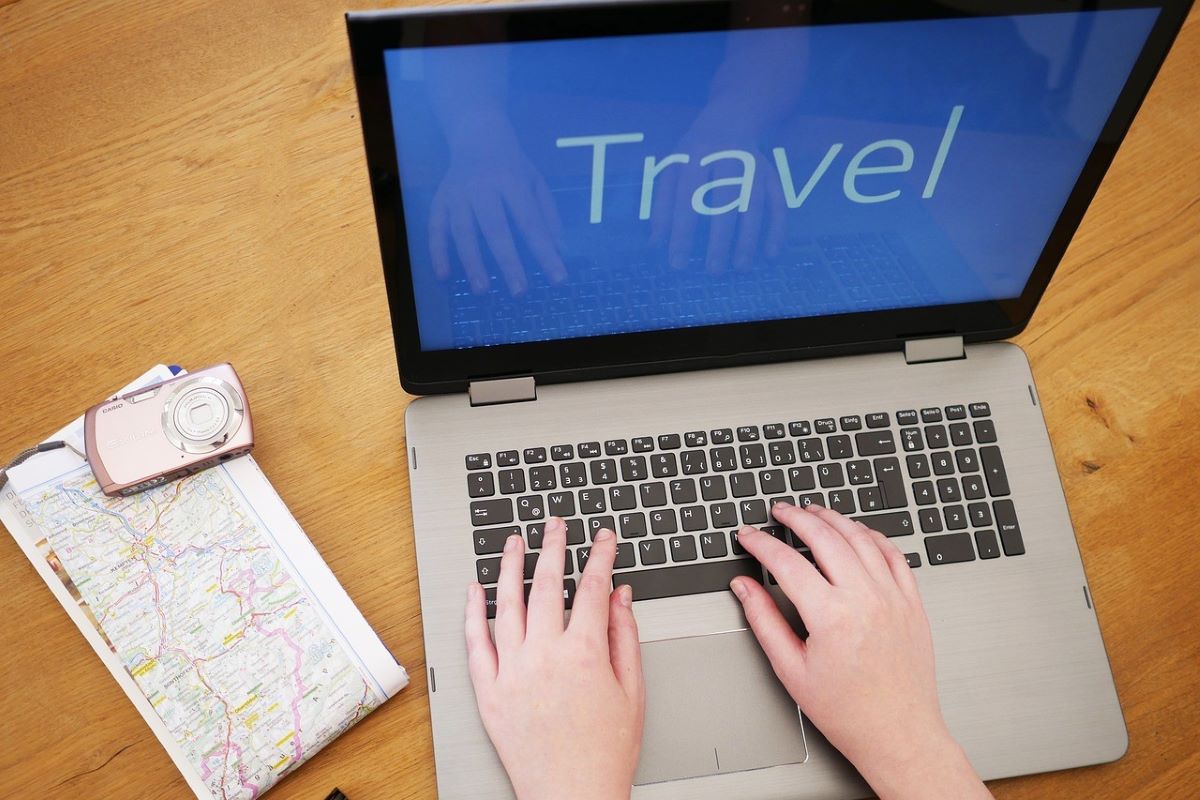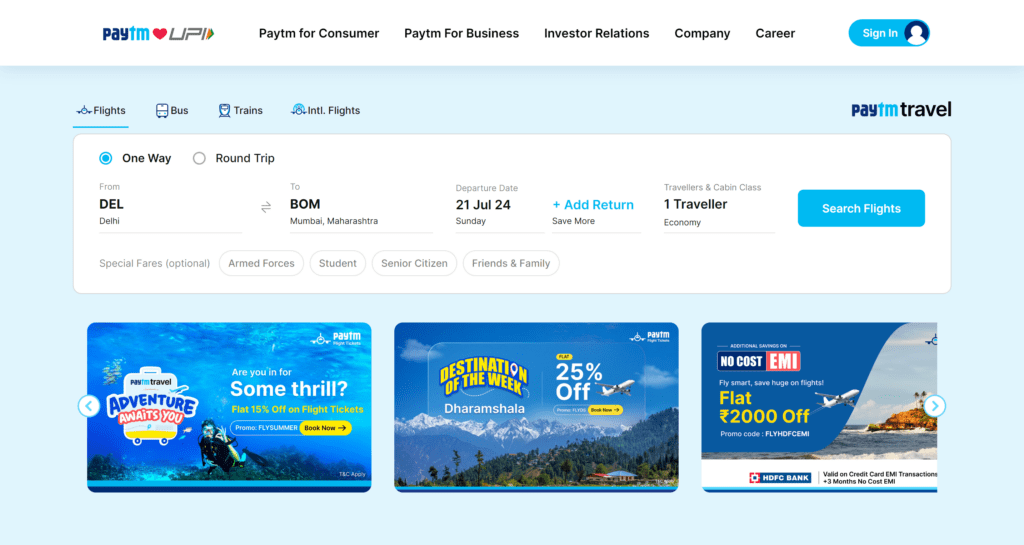Paytm’s Latest Moves in Travel – India Report

Paytm started as a financial services company in India, but is now diversifying its revenue streams, with a special focus on travel. The fintech company often refers to itself as an online travel agency and is looking at travel as a core business segment.
In the latest move to enhance its travel offerings, Paytm has entered into a strategic partnership with German intercity bus services company FlixBus, which entered India in February this year.
Becoming an OTA? Officially, Paytm is still a “mobile payments and financial services distribution company,” with a mission to bring 500 million Indians to the mainstream economy using technology.
However, after its payments bank (which overlooked the payments wallet, customer accounts, and fixed deposits) was closed earlier this year by India’s central bank, the Reserve Bank of India, the fintech player has been looking at alternative sources of revenue, with travel being one of them.
On the Paytm’s website, Paytm Travel is the first segment to appear, letting customers book flight, bus, or train tickets.

Paytm’s chief business officer Vikash Jalan stressed travel in his statement on the partnership with FlixBus: “As a leading travel aggregator, we are committed to enhancing the overall travel experience in India. Our partnership with FlixBus marks a significant step forward in this mission, directly aligning with our core business objectives to drive growth in the travel sector.”
Last month, Paytm announced its partnership with travel aggregators Skyscanner, Google Flights, and Wego. The move had followed a 19% annual increase in flight bookings on Paytm in the January-March quarter this year.
It recently added features such as guaranteed seat assistance to its train booking segment, and partnered with Samsung to offer flight and bus ticket bookings through Samsung wallet.
Its travel division has also brought on board three new airlines to its selection – Cambodia Angkor Air, SalamAir, and FlyDubai.
Importance of Paytm: Paytm played a crucial role in India’s digital economy, especially after the demonetization in November 2016, in which the Indian government discontinued the INR 500 and 1,000 cash notes to curb the issue of counterfeit currency. The move led to a boost in digital payments in India and Paytm got the first mover’s advantage in QR-based mobile payments using its payment wallet.
Paytm’s user base increased from about 140 million in October 2016 to 270 million a year later, reaching more remote parts of the country.
This user base of smaller towns in India makes Paytm a crucial player, giving it a slight advantage over other OTAs.
Surge in Visa Applications for France Before Paris Olympics
Online visa platform Atlys has seen a 60% surge in visa applications for France from Indian travelers ahead of the Summer Olympic Games in Paris. Applicants from metro cities including Delhi, Mumbai, and Bangalore hold the largest share.
There has also been a 45% increase in group visa applications as Indians are planning to travel to the Olympics with their families and friends.
Sports tourism is on a rise in India, as Skift previously reported. Indian online travel companies have been witnessing up to 40% increase in demand for global sporting events, including tennis tournaments, the cricket World Cup series, Olympic Games, and F1.
Atlys has also seen a 50% surge in sports tourism-related queries, with travelers also seeking to visit French sports venues like Stade de France and Stade Roland Garros.
Mumbai Airport Records 7% Growth in Passenger Traffic
The Chhatrapati Shivaji Maharaj International Airport (CSMIA) in Mumbai recorded a footfall of more than 13.4 million passengers between April and June 2024. This marked a 7% increase over the same quarter last year.
In May alone, the airport catered to 4.7 million passengers, CSMIA shared in a statement. Mumbai is the second-busiest airport in India, after Delhi.
Among domestic markets, Delhi, Bangalore, and Hyderabad were the top three destinations for passengers traveling from Mumbai. Internationally, most passengers traveled to Dubai, Singapore, and London.
Indian airlines IndiGo, Air India, and Vistara held the highest market share in domestic and international traffic at the airport during the quarter, CSMIA shared.
Air India Partners With The Bicester Collection
Full-service airline Air India has partnered with luxury shopping destinations business The Bicester Collection. The partnership will allow members of Air India’s loyalty program Flying Returns to accumulate reward points on shopping and dining at The Bicester Collection’s open-air villages in Europe.
“The demand for luxury shopping among Indians continues to boom at record pace, with Indians now being counted amongst the highest spenders during their travels across the world,” said Air India head of marketing, loyalty and e-commerce Sunil Suresh.
During the 2023-24 financial year, Indians spent $31.7 billion, reaching a new peak in overseas spending. Of this, 54% or $17 billion was on international travel, marking a 25% increase from the previous year.
Radisson Opens Grand Mirage Dhanbad in Jharkhand
Radisson Hotel Group has opened Grand Mirage Dhanbad, a member of Radisson Individuals, in Jharkhand. The hotel features 70 rooms and suites.
The property is a part of Radisson’s strategy to focus on the tier 2 and 3 cities in India for its expansion, as more than 50% of its 180-hotel portfolio is located in smaller cities.
Executive vice president and global chief development officer Elie Younes also shared this with Skift earlier this year, saying, “Our expansion plans for 2024 are ambitious, focusing not only on major metropolitan cities but also targeting Tier 2 and Tier 3 towns to cater to the growing demand in these markets.”
Radisson operates 10 brands in India, including recently launched Radisson Collection, Radisson Individuals, and its extension Radisson Individuals Retreats.
Related
Turkish Airlines and Qatar Airways Suspend Mogadishu Flights Following US…
Home » Airlines News of Qatar » Turkish Airlines and Qatar Airways Suspend Mogadishu Flights Following US Embassy Terror Alert, Raising Security Concerns at
Local tourism destinations grow fast
Men sit at the Doha Corniche backdropped by high buildings in Doha on March 3, 2025. Photo by KARIM JAAFAR / AFP DOHA: Local tourism destinations are g
Hajj, Umrah service: Qatar Airways introduces off-airport check-in for pilgrims
Image credit: Supplied Qatar Airways has introduced an off-airport check-in
IAG, Qatar Airways, Riyadh Air, Turkish Airlines, Lufthansa & more…
Turkish Airlines – a Corporate Partner of the FTE Digital, Innovation & Startup Hub – is charting a course to rank among the top 3 global airlines for












